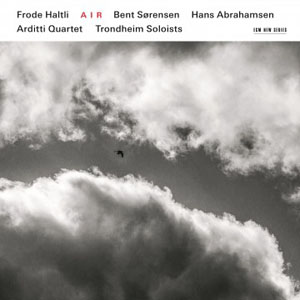 I discovered fairly recently that, when you get into the contemporary music of Northern Europe, “accordion music” is not at all what we think it’s going to be. Which leads me to this recently released collection by Norwegian accordionist Frode Haltli, Air.
I discovered fairly recently that, when you get into the contemporary music of Northern Europe, “accordion music” is not at all what we think it’s going to be. Which leads me to this recently released collection by Norwegian accordionist Frode Haltli, Air.
Haltli began playing the accordion at age seven, and, as one might expect, his early focus was on folk music. However, he began exploring other forms, not only the music of contemporary Scandinavian composers, but the classical idiom as well. This collection sees him performing the music of Danish composers Bent Sørensen and Hans Abrahamsen in works that feature not only solo accordion, but also combine it with a string quartet and a chamber orchestra.
Bent Sørensen’s “It is Pain Flowing Down Slowly on a White Wall” was sparked by a note passed to him after a concert by a woman who had written that sentence down – a line of poetry as she remembered it. There is a sense of flowing to the music, broken by more abrupt passages. Paul Griffiths, in his essay accompanying the disc, notes as a difference between the Romanticism of the nineteenth century and our own contemporary Romanticism the loss of the “I” – the first-person singular is no longer a key element. There is that sense in this piece: it’s rather abstract, both in concept and execution, and while the soloist takes center stage, he is not alone. In a way, it’s almost like a flash mob: there’s a sense of chance playing a significant role as the accordion is joined by other voices, which then go their way to be replaced by still other voices. If this makes the piece sound rather ad hoc, it’s not: the underlying structure is there, playing off the reveries against the sudden, almost jarring contrasts with that “urban angst” that is so much a part of contemporary music.
The title of Hans Abrahamsen’s “Air” is, at the very least, ambiguous. It could denote a song – in this case, four songs, cast as movements – or an attitude or mood – and, as might be expected, there are several moods to this piece – or the mere fact that the music is, indeed, produced by the movement of air across the reeds of the accordion. The feel is distinctly modernist, although with a strong infusion of that Romanticism that Griffiths referred to. There’s almost a sense of melancholy to the third movement – as Griffiths calls it, “a memory of what was already a memory” – that carries through to the final movement and then becomes more reverie than anything else.
Abrahamson’s “Three Little Nocturnes”, again with that strong modernist cast, brings what could almost be seen as dances, although more on the order of Martha Graham than a village festival. There’s a finely drawn tension in the first movement, shattered by the exuberant beginning of the “Allegro” (carried largely by strings with the accordion as a counterpoint). I can’t characterize the final movement, a very quiet near-duet between accordion and violin, as anything other than suspenseful: there’s a sense of something going on underneath anything that we can perceive.
Bent Sørensen’s “Sigrid’s Lullaby” – incidentally, the only piece that was not composed for Haltli – closes the collection, and is what we would expect a lullaby to be: soothing, melodic in an understated way, tapering off into silence.
In some ways this is a very deceptive collection – contemporary, yes, but not with the hard-edged tension that we often expect: there is tension, but it’s organic, almost a matter of the music commenting on itself. It’s a collection that deserves the listener’s full attention.
Frode Haltli is accompanied by the Trondheim Soloists and the Arditti Quartet.
(ECM Records, 2016)
